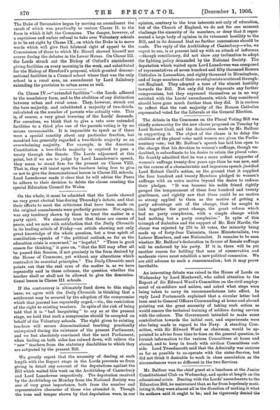The debate in the Commons on the Plural Voting Bill
was chiefly noteworthy for the new clause proposed on Tuesday by Lord Robert Cecil, and the declaration made by Mr. Balfour in supporting it. The object of the clause is to delay the abolition of the plural voter until women are given the Parlia- mentary vote; but Mr. Balfour's speech has laid him open to the charge that his devotion to women's suffrage, though un- doubted, is subordinate to his desire to retain the plural voter. He frankly admitted that he was a more ardent supporter of . women's suffrage twenty-five years ago than he was now, and in the course of a characteristic and ingenious speech justified Lord Robert Cecil's action, on the ground that it supplied the four hundred and twenty Members pledged to women's suffrage with an extra motive beyond the desire to redeem their pledges. "It was because his noble friend rightly gauged the temperament of these four hundred and twenty gentlemen, and rightly saw that there could be no motive so strong applied to them as the motive of getting a party advantage out of the change, that he sought to link together the great change, the great reform which had no party complexion, with a simple change which had nothing but a party complexion." In spite of this triumph of dialectics and the support of Mr. Keir Hardie, the clause was rejected by 278 to 50 votes, the minority being made up of forty-four Unionists, three Ministerialists, two Labour Members, and one Nationalist. It remains to be seen whether Mr. Balfour's declaration in favour of female suffrage will be endorsed by his party. If it is, there will be yet another reason for holding that men of conservative and moderate views must establish a new political connexion. We are still adverse to such a consummation; but it may prove inevitable.






























































 Previous page
Previous page